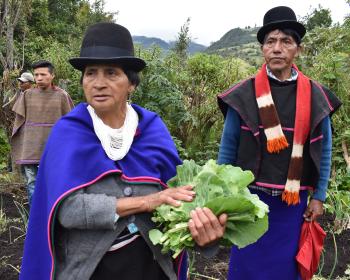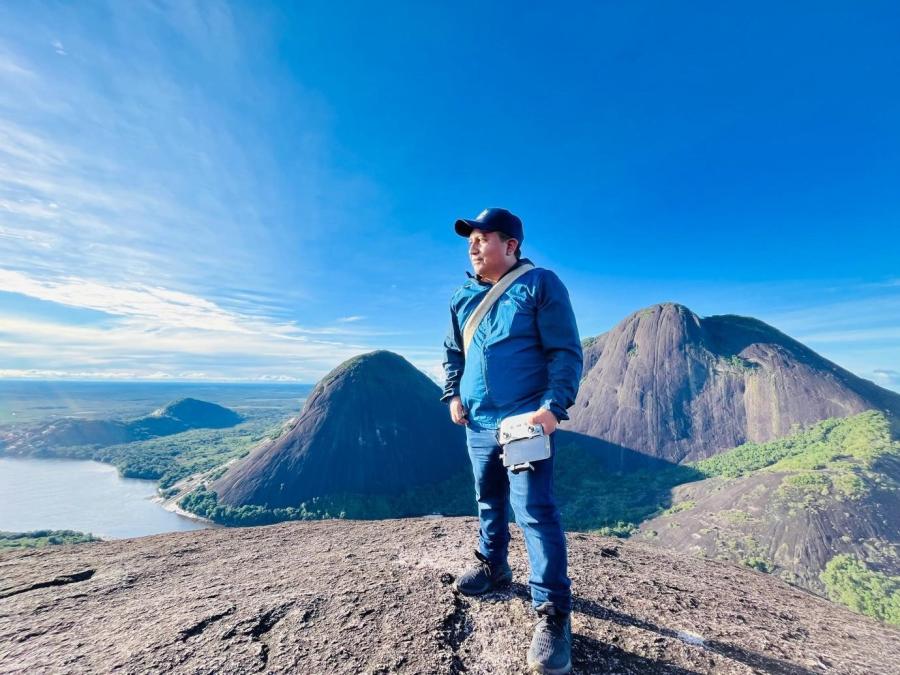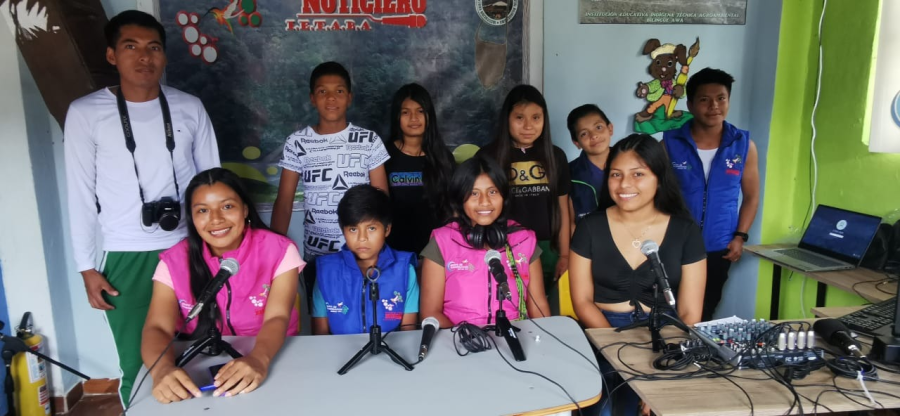In continues to be a last line of defense for indigenous peoples. However, when processes of colonization reach advanced stages, the cultural and spiritual aspects of this resistance become a critical part of the survival strategies of beleaguered communities.
The continued physical existence of indigenous peoples requires a variety of factors--from land and resources to social and cultural cohesion. While territoriality is vital to the survival of indigenous communities, cultural rules and regulations are also required for successful social reproduction and the maintenance of the physical environment. These cultural aspects of the existence of indigenous peoples are intricately related to the spiritual guidance provided by elders and the unique cosmovision of communities. Thus the strategies communities have devised for the defense of land and culture have often located physical resistance--violent or non-violent--within a spiritual-cultural context. The resulting spiritual resistance, while at times ineffective against violent physical incursions, has at least the effect of reinforcing the cultural-spiritual cosmovision that remains a critical aspect of survival.
For Colombian indigenous communities caught in the crossfire of heavily armed guerilla, military, paramilitary, and private security forces, violent resistance is hardly a viable option. For these communities, the reinforcement of spiritual and cultural codes—the reintegration of ancient knowledge and tradition--becomes a last line of defense.
As Jane Rappaport describes in her article (see page 39 this issue), the indigenous communities of the Cauca region have to this point successfully used cultural renaissance and community strengthening as an integral aspect of non-violent territorial defense. Among other Amazonian indigenous communities, such as that described below, the dangers of physical resistance have made the purely spiritual aspect of the resistance the last hope of besieged communities. The following narrative is from an interview with an anonymous community leader:
In relation to other provinces, we haven't lived so much the violence that Colombia sees everyday: bodies in the streets, in the rivers, in the communities. Nonetheless, we have faced difficulties with a front of the FARC [Revolutionary Armed Forces of Colombia], up to such a point that we had to go retrieve the bodies of seven massacred indigenous brothers on one occasion. They killed them simply because it's not convenient for the FARC for us to organize ourselves and resist the politics that they have tried to impose on us, and which go against our principles as indigenous peoples.
We are a community that's very far from the center of the country. You could say we're almost in another country. There the guerrillas, the military, the businessmen, and the politicians do and undo what they wish with our territory. Seeing this, we organized as a community, as an organization that was born in 1995. It was born strong, speaking clearly, making political and ideological proposals without fear, founded in our own way of thinking.
It's a way of thinking based on ideological rebellion, I would say. Why? Because we've realized that if we keep playing in between the established norms and laws that the Colombian state imposes on indigenous communities, we simply remain their caretaker, as if we were the plate they serve their food on. We realized that we have no dignity, that we're losing our autonomy and our identity. As human beings, we were simply treated worse than animals. Because of this, we organized ourselves strongly, speaking out, setting out, without stepping on anyone--simply proposing our own ideology: autonomy, dignity, culture, everything that has to do with a community and a society.
We had to speak out against the government. But we also saw that the FARC do and undo what they will with our communities: They require cheap labor to shave coca leaves, they impose their authority on our communities, they exploit our young indigenous brothers without anyone's permission, and they don't recognize our traditions. Upon seeing this, we also spoke out. It was clear that by being prevented, as indigenous communities, from stating our principles of life, we would eventually become displaced.
We went to our communities to say to them: "Here, you all are the authority. Here, you are the ones who rule. Here you are the ones who say at what hour you go to sleep and at what hour you wake up. Here no one is going to impose anything." The FARC are prohibiting fishing, they are prohibiting movement on our rivers to hunt--a number of impositions. We came--the children of our ancestors--to tell them that we should organize ourselves and nothing more. So these guerilla friends I mentioned before, upon seeing this, simply used a massacre to intimidate us, to dull and silence our thinking. To intimidate us, they took seven of our brothers and massacred them. We ourselves went and picked them up, without fear, and without help from any government.
After the massacre, one of our elders publicly said, in the plaza in front of everyone, perhaps with pain: "We're going to take revenge. We're going to take revenge as soon as possible." Our grandfathers, when they saw the critical, difficult situation, the persecution, they used some natural herbs to protect us from these enemies--these are strategies which cannot be told because they are from our own culture. They are strategies of war, but above all I would say they are strategies of defense, because as indigenous, we characterize ourselves as peaceful communities, as harmonious communities, as communities of reconciliation. These defenses have a lot to do with our relation to nature, our relation to the land, to the tribe, to the trees. They utilized mechanisms of prayer and communication with nature, spirituality, and the results came effectively. As a result, the following day the FARC had an accident. Twenty six guerrilla members were sleeping by the shore of a river, and a group of paramilitaries found them and surprised them. All of them died.
Since then I've always said that if indigenous communities want to enter in a process of resistance, pacific or ideological, we should care for our own wise, traditional knowledge. Logically we shouldn't promote violence, rather a wise spiritual defense, with respect, a lot of respect, with a profound respect. These are the weapons of defense we have, and they work. We shouldn't use physical weapons, like arrows or firearms. Rather we should care for our Mother Nature so that she takes care of defending us. She herself protects us.
We consider that we should give a good lesson to these sectors. I'll say again that we don't want confrontation with any of the sectors that are in conflict, because we consider their thinking childish, because they're destroying one another as humans who are surely brothers--for something that's not worth it. In this case, Colombia and the FARC massacre themselves among brothers. Among poor campesinos who are in the military and who are in the guerrillas, they massacre each other. Meanwhile, the Colombian state is playing with other interests. So we're beginning a very sane, wise proposal, so our brothers can understand this.
Initially, before being assimilated into the Colombian state, we had a highly indigenous formation in our community. But afterwards, in our formation inside Western culture, we realized that to keep defending ourselves within a philosophy that isn't ours doesn't guarantee us much. We knocked on a window to our elders, who still existed. No one had promoted or stimulated our elders to teach their knowledge without fear, because it's not convenient for any of the sectors that are against us.
We have our territory marked spiritually. Our fathers teach us that we can't cross the territory without the previous permission of some elder or from nature itself. For example, if I'm along one river, to go to another river I have to meet requisites. In this way we defend our territory. The people who are not from the territory, colonists, don't arrive now. Before, they came to mine the rivers to extract gold. Over there they died in great numbers until they understood that they can't keep working. It's a way in which we take care of our territory.
As indigenous communities we understand that the politics of the government of the United States is to wipe away the people who don't produce economy, and in this case in Colombia. This we've understood, and because of it we're beginning to signal an alternative of life and existence. In what way? By saying to the North American state, through our way of thinking, that we can't try to project a high level of development by massacring people, massacring communities, getting rid of a whole cosmovision that also forms part of the society of the universe, as United States politics would have. This is an alternative that we want to propose: a different world.
We're convinced that they won't understand it. Our country has been handed over to the United States as far as politics; nonetheless, until God doesn't permit us, we'll keep proposing this different alternative of life and existence--as we see development. We consider that we should keep strengthening our communities, our blessings, and our own ways of living through the example of creating harmony, through creating good teachings for life.
We want the world to understand that we have an integral vision of things. If we're going to see Plan Colombia, don't just think of the indigenous man as a person, as a biological being, as meat and bones. Rather also see that we're an integral part of nature. Without nature, without the environment, without the river, without a number of things, we aren't anything. Any initiative that's taken always needs to see the indigenous world as integral.
David Edeli (edeli@post.harvard.edu) is a researcher and consultant for the Confederation of Indigenous Nationalities of the Ecuadoran Amazon and a program associate of the Program on Non-Violent Sanctions and Cultural Survial. Zachary Hurwitz (z_hurwitz@yahoo.com) is an independent journalist and activist living in Quito, Ecuador.



